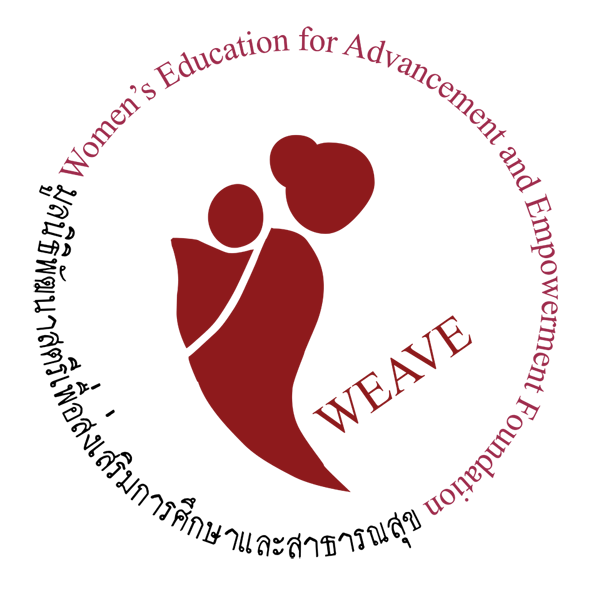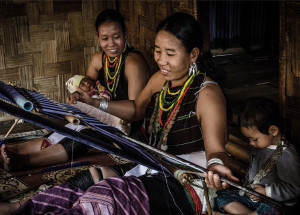By Nikos Dacanay
The first time I met a WEAVE artisan was in 2009 in Umphiem Mai camp while doing research on WEAVE’s Income Generation Project (IGP). I had crossed the South China Sea that divides my country and Thailand, and had trekked many hours of rough road to be transported from the city of Manila where I was born and raised to the deep forests that border Thailand and Burma. I had armed myself with a lot of readings about the struggles of the ethnic people fleeing the oppressive Burmese military and was expected to be inundated by a different world quite alien to the environment I grew up in; but I was all ready for the challenge. And then I met for the very first time – in flesh and bone– the people I had, since that point, been familiar with only in words.

Nong Ngeh is a 24 year-old weaver who arrived in Umphiem Mai with her mother nine years ago, leaving behind her father and sisters in Burma. Her whole family left their village that was ransacked by the Burmese military, and she and her mother were separated from her father and sisters. She came from a family of weavers and her sisters and aunties taught her how to weave when she was just 10 years old. When she joined WEAVE three years ago, she tapped these undeveloped basic weaving skills so she could earn extra income for herself and her mother, who is already too old to weave. She said that more than anything, it’s really because of her sisters that she weaves. “I weave for my sisters. I miss them so much. It’s the only skill that I know which my sisters had taught me at a very young age. It also allows me to stay at home, guard the house, and take care of my mother who is already old and cannot do much household work.” She has improved on her weaving skills because of the training provided by her aunties who are quality control (QC) weavers for WEAVE. It has been nine years since she last saw her sisters and she misses them terribly. When she weaves, she remembers them and their hut by the farm and this lessens the homesickness.
Nong Ngeh’s story would not be the only painful story of family separation that I would hear. In my interviews with other women in different camps, while each one had a unique life story to narrate, the story of loss and sacrifice would echo over and over again, and it seemed like only their faces differed. A pained expression would register on their faces as they recollected the events that transpired when they left their homes and farms, never knowing when they would return because they feared for their lives.
I can say that I understood suffering and discrimination. But the nature of psychological trauma of families and villages – of two generations – all uprooted from their homeland and locked in a place that is neither here nor there, without a land to call their own, without a nation to celebrate, without citizenship, completely overwhelmed me. Automatically many of the basic rights that I usually take for granted had already been taken away from them as displaced people. In my own reflection as a Filipino, where I grew up in a country that struggled with foreign colonizers and tyrants and now enjoys a society that exercises full democratic rights, the women’s stories were very heartbreaking to hear. I had grown up marching down the streets, protesting my government’s misgivings, and demanding better services. All of these are not privileged to these ethnic people. Because they refuse to pledge allegiance to a military government that mistreats them, they do not have social institutions which they can call their own and which they can rely on and demand services from. The Thai government has allowed temporary shelter for them but social integration with the Thai community seems like a distant horizon. The development and humanitarian groups whom they significantly depend on are not totally responsible for their general well being. These groups can only help so much and can leave any time their funds deplete. The ethnic people are basically at the mercy of people with good souls.
However, theirs was not only a story of tragedy but also – and equally more so – a story of bravery and heroism. In the course of my stay with WEAVE and my interviews with the women, I learned one basic thing: pity is the last thing they need from other people wanting to understand and help them. Stereotyping them as “marginalized” and “oppressed” does not help them in any way and, at the very least, oversimplifies their skills and capacity as people trying to rise from life’s challenges. Of course, we cannot hide the oppressive structures and history that have led them to the situation they are currently in. But in the course of managing their lives with assistance from NGOs, one cannot say they are totally marginalized. Indeed, what I found amazing was how they took over the crisis and turned it into an opportunity. Their strong will to survive against all odds, their deep faith in their religions, and their pride in their ethnic cultures have allowed them to decide, albeit on very limited spaces, how they would lead their lives. In the research that I’m doing on ethnic women’s use of information communication technologies (ICTs), what became apparent was how they appropriate technology not only for their political cause but also to invigorate their culture and tradition and build stronger social relationships with their now diasporic and multi-geographically located families and with the larger international community.
Nowhere is their capacity as people more clearly demonstrated than in WEAVE’s journey with them. When WEAVE started the income generation project (IGP) by selling Christmas cards that women in the camps made, it did not imagine it would develop into a dynamic and big project that would eventually see hundreds of women getting sustainable income from their handicraft products. From countless trainings over the course of more than 20 years, the women learned to produce more than one hundred different kinds of products, weave and embroider difficult patterns, and sew thousands upon thousands of items that people around the world now purchase and admire.
I thought the women in the camps were very efficient in picking up skills and maximizing these skills for income. What was astonishing was how they managed to convert the entire project as their own, refusing to inject colors and patterns that would take away their cultural identity into the products that they produce. Indeed, weaving for them is not only a job but a product of their voice as Karen people, and they would not let anybody dictate how they should weave. Talk about women empowerment!
IGP Fair Trade Shop in Mae Sod is now being relaunched this March 25, complete with full regalia of a promotional blitz. IGP has come a long way from its humble origins more than ten years ago. This is a celebration of women’s pride and a testament to the commitment of WEAVE to continue providing work to women in the camps and in the migrant towns through handicraft training and production. Indeed, the celebration keeps well with this year’s theme on the celebration of the International Women’s Day by the United Nations (UN) which is “Equal access to education, training, and science and technology: pathway to decent work for women”. WEAVE has been fulfilling this message for the last 20 years of the organization’s existence.
When I look back at the story of Nong Ngeh I realize how my perspective of things has changed since I first came here. I came to Thailand carrying with me all the cultural baggage of my education and work experience and my desire to “help” these “unfortunate” people. While working with the women and children on the border, I was humbled by the lessons I learned from the struggles of women and the progress of rights and opportunities that have come not entirely because of the help of development groups but mainly because of their own will to better themselves. In trying to help, I was educated about life in general and even learned a great deal about myself as a Filipino. In retrospect, I know now that working with these people does not privilege them but privileges the NGO worker such as myself. In my case, the lesson I learned about the Karen people who have lost so much but have never lost faith in their God is something I will carry with me for the rest of my life.

